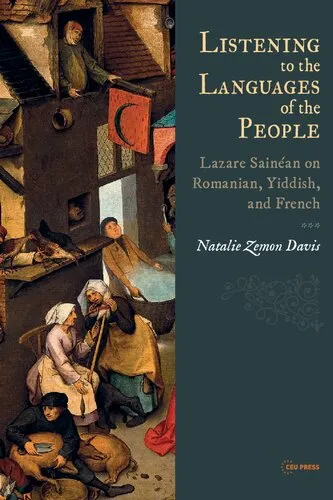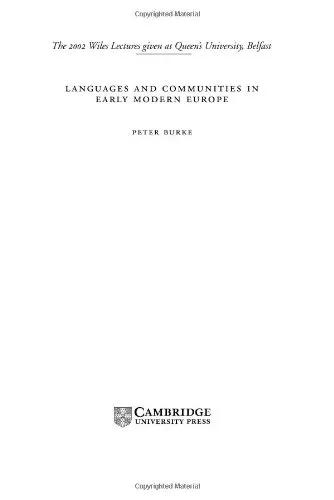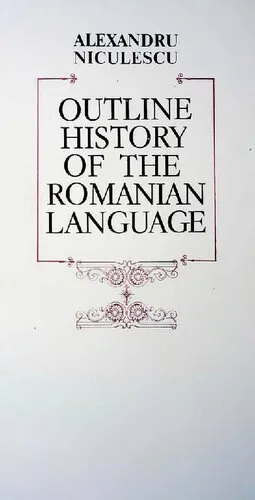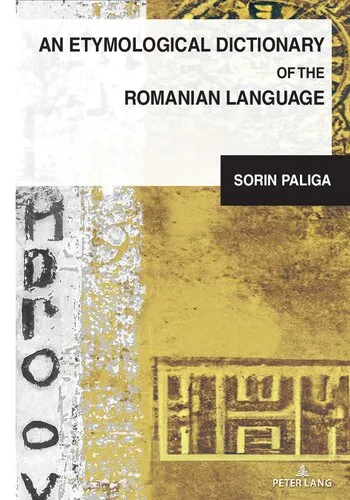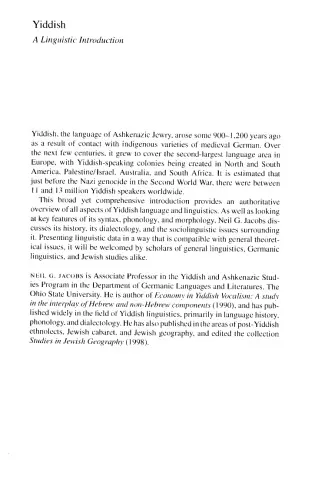Listening to the Languages of the People: Lazare Sainéan on Romanian, Yiddish, and French
4.5
بر اساس نظر کاربران

شما میتونید سوالاتتون در باره کتاب رو از هوش مصنوعیش بعد از ورود بپرسید
هر دانلود یا پرسش از هوش مصنوعی 2 امتیاز لازم دارد، برای بدست آوردن امتیاز رایگان، به صفحه ی راهنمای امتیازات سر بزنید و یک سری کار ارزشمند انجام بدینکتاب های مرتبط:
معرفی جامع کتاب "Listening to the Languages of the People: Lazare Sainéan on Romanian, Yiddish, and French"
کتاب "Listening to the Languages of the People" نوشته ناتالی زیمون دیویس، یکی از برجستهترین تاریخشناسان اجتماعی، به بررسی زندگی و آثار لازار سینئن (Lazare Sainéan) و نقش او در مطالعه زبانهای رومانیایی، ییدیش و فرانسوی میپردازد. این اثر به معنای واقعی کلمه پلی میان تاریخ، زبانشناسی و فرهنگپژوهی است و نشان میدهد چگونه زبانها، راهی به سوی فهم پیچیدگیهای تاریخی و اجتماعی ملتها هستند.
خلاصهای جامع از کتاب
این کتاب به زندگی و کارهای لازار سینئن، مردمشناسی که دغدغههای او فراتر از زبانشناسی بود، نگاه جامعی میاندازد. سینئن که یک یهودی اهل رومانی بود، در دوران بازتاب تغییرات اجتماعی و سیاسی اروپا به تحلیل ماهیت زبانها پرداخت. او زبان را بهعنوان سلاحی برای درک تحولات اجتماعی و شناسه هویتی فرهنگی میدانست.
کتاب نه تنها به بررسی کارهای اساسی او در زبانشناسی رومانیایی و ییدیش میپردازد، بلکه تعاملات و تأثیر او در زبان فرانسوی و مفهوم زبان بهعنوان عنصر هویت ملی را مورد بررسی قرار میدهد. ناتالی زیمون دیویس از طریق این اثر، پیچیدگیهای نقش زبان در تحولات تاریخی را تحلیل کرده و نشان داده است که زبان چگونه با هویت قومی، ملی و اجتماعی پیوند دارد.
نکات کلیدی کتاب
- نقش زبان در ساخت هویت اجتماعی و ملی.
- تحلیل زبان بهعنوان ابزار مقاومت فرهنگی و اجتماعی در برابر سلطه سیاسی.
- اهمیت ییدیش بهعنوان زبانی با کاربرد دوگانه؛ هم مذهبی و هم دنیوی.
- پیوند بین زبان رومانیایی و تاریخ ملت رومانی، و تأثیر سیاستهای ملیگرایانه بر زبان.
- نقد نحوه تعامل قدرتهای استعماری با زبانها و فرهنگهای مردمی.
جملات معروف از کتاب
"زبانها نه تنها کلماتی برای برقراری ارتباطاند، بلکه حاملان تاریخ و حافظه جمعیاند."
"هر زبانی آینهای برای دیدن معانی عمیقتر جامعهای است که آن را سخن میگوید."
"جویبارهای کوچک زبانهای محلی، بستر رودخانه پرخروش هویتهای ملی هستند."
چرا این کتاب اهمیت دارد؟
کتاب "Listening to the Languages of the People" نگاهی تازه به اهمیت تاریخی زبانها و رابطه آنها با سیاست و فرهنگ دارد. در دنیای معاصر که مسائل هویتی و زبانی همواره مورد بحث هستند، این اثر دیدگاههای ارزشمندی در اختیار پژوهشگران حوزههای مختلف قرار میدهد. از طریق تحلیل زندگی و آثار لازار سینئن، نویسنده نشان میدهد که چگونه تاریخنگاری زبان میتواند نوری بر مسائلی چون تبعیض، مقاومت فرهنگی و بازسازی هویتهای اجتماعی بیافکند. این کتاب مخصوص تمامی افرادی است که به تاریخ، زبانشناسی، یا جامعهشناسی علاقه دارند و به دنبال فهم عمیقتر از روابط پیچیده میان زبان و جامعه هستند.
Introduction
Language is not merely a tool for communication; it is a reflection of cultural identity, history, and the social dynamics of the people who speak it. Listening to the Languages of the People: Lazare Sainéan on Romanian, Yiddish, and French delves into the vibrant linguistic tapestry of these three languages through the life and scholarship of Lazare Sainéan, a prominent philologist and linguist. Written by Natalie Zemon Davis, this book is a masterful exposition of how languages intertwine with culture, politics, and history to create a powerful narrative of identity and social change.
By situating Sainéan’s extensive work in the context of his life and times—spanning Eastern Europe to France—this book offers readers not only a historical exploration of Romanian, Yiddish, and French but also an intellectual biography of a figure whose contributions are often overlooked. Davis interrogates how Sainéan used his expertise to challenge societal norms, fight antisemitism, and foster an appreciation of marginalized voices. Packed with linguistic insights and historical analysis, this book invites readers to reflect on language as a form of social agency, placing Lazare Sainéan’s legacy at the center of cross-linguistic and cultural studies.
Detailed Summary of the Book
Listening to the Languages of the People is structured around Lazare Sainéan’s life trajectory and intellectual journey. Born as Lazar Şăineanu in Romania in the late 19th century, Sainéan’s early experience with Romanian and Yiddish shaped his understanding of language as a dynamic force capable of uniting or dividing societies. He was passionately invested in studying Romanian, documenting its evolution and connections to other languages in the Balkan linguosphere. His pioneering research on Romanian folklore and literature earned him both praise and controversy in his homeland, particularly due to his Jewish heritage and the rising tide of nationalism.
Forced to leave Romania due to antisemitic pressures, Sainéan relocated to Paris, where his scholarship continued to evolve. Immersing himself in French linguistics, he sought to explore the intersections between language, culture, and society. Davis explores how Sainéan’s analysis offered profound insights into French vocabulary, tracing its development through centuries of social transformation.
Similarly, Davis illuminates Sainéan’s work on Yiddish—a language often dismissed during his time. He saw Yiddish as the “language of the people” and underscored its value in understanding Jewish life, identity, and resistance. Davis’ narrative highlights Sainéan’s commitment to elevating Yiddish and other vernacular languages as worthy subjects of scholarly inquiry, countering dominant narratives that marginalized them.
Through these linguistic explorations, the book captures themes of migration, resistance, and adaptation, while weaving together a story that is both deeply personal and broadly historical. Lazare Sainéan’s work emerges as an act of cultural preservation and advocacy for mutual understanding across linguistic boundaries.
Key Takeaways
- The study of language is intertwined with culture, politics, and power dynamics.
- Lazare Sainéan’s scholarship highlighted the vibrancy and significance of Romanian, Yiddish, and French, emphasizing their roles in shaping cultural identity.
- Language can be a tool of resistance and self-expression, particularly for marginalized communities.
- Sainéan’s focus on vernacular languages challenges elitist notions of linguistic hierarchy.
- The book reinforces the importance of cross-linguistic studies in fostering empathy and understanding in diverse societies.
Famous Quotes from the Book
“Language is not merely a means of communication; it is the soul of a community, its repository of memory and dreams.”
“In elevating the Yiddish language, Sainéan offered a bold rebuke to those who sought to erase the voices of the marginalized.”
“The history of language is, in many ways, the history of its speakers—their struggles, migrations, triumphs, and defeats.”
Why This Book Matters
Natalie Zemon Davis’ Listening to the Languages of the People is more than a biography of Lazare Sainéan; it is a timely reminder of the enduring power of language to shape cultures and communities. By recovering Sainéan’s groundbreaking contributions to the study of Romanian, Yiddish, and French, Davis celebrates linguistic diversity and underscores the urgency of preserving endangered languages and marginalized voices.
The book bridges the humanities and social sciences, making it valuable for linguists, historians, sociologists, and general readers alike. Its exploration of antisemitism, migration, and intellectual resilience resonates deeply in the current global context, where issues of identity, belonging, and exclusion remain pressing. Davis invites her audience to listen to the languages of the people—not as relics of the past but as living, evolving expressions of human creativity and resilience.
With its meticulous research and compelling narrative, this book redefines the place of language in understanding history and culture, making it an essential read for anyone interested in the rich interplay between words and the world we live in.
دانلود رایگان مستقیم
شما میتونید سوالاتتون در باره کتاب رو از هوش مصنوعیش بعد از ورود بپرسید
دسترسی به کتابها از طریق پلتفرمهای قانونی و کتابخانههای عمومی نه تنها از حقوق نویسندگان و ناشران حمایت میکند، بلکه به پایداری فرهنگ کتابخوانی نیز کمک میرساند. پیش از دانلود، لحظهای به بررسی این گزینهها فکر کنید.
این کتاب رو در پلتفرم های دیگه ببینید
WorldCat به شما کمک میکنه تا کتاب ها رو در کتابخانه های سراسر دنیا پیدا کنید
امتیازها، نظرات تخصصی و صحبت ها درباره کتاب را در Goodreads ببینید
کتابهای کمیاب یا دست دوم را در AbeBooks پیدا کنید و بخرید
1266
بازدید4.5
امتیاز0
نظر98%
رضایتنظرات:
4.5
بر اساس 0 نظر کاربران
Questions & Answers
Ask questions about this book or help others by answering
No questions yet. Be the first to ask!
